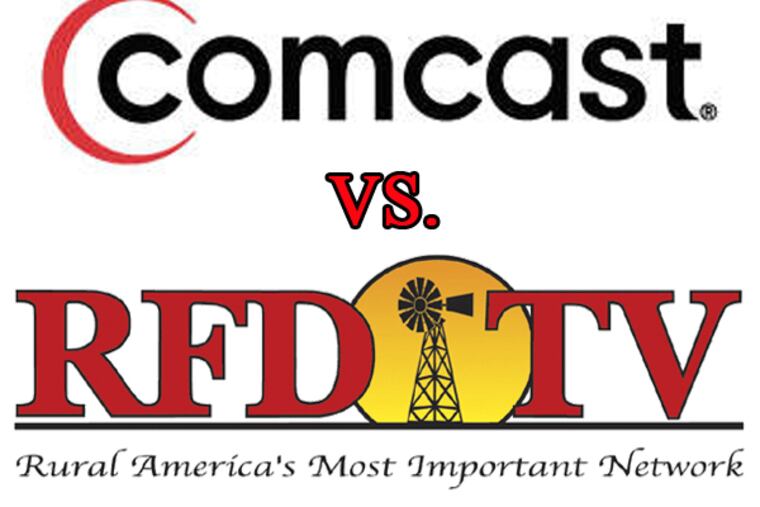It's a barnyard brawl between Comcast and RFD-TV
Comcast Corp. is facing a political battle in Washington with a rural television network that airs bluegrass bands, farming news, and Hee Haw reruns.

Comcast Corp. is facing a political battle in Washington with a rural television network that airs bluegrass bands, farming news, and Hee Haw reruns.
Comments have flooded the Federal Communications Commission docket - perhaps as many as 18,000, the network says - in the two weeks since RFD-TV's call-out to viewers on the Internet and cable channel.
"It's crunch time," Patrick Gottsch, chairman and founder of the Rural Media Group Inc., in Omaha, Neb., said this week in a phone interview.
"You got television executives who don't seem to look out the window between Philadelphia and Hollywood."
As TV executives go, Gottsch is a singular sort, fancying cowboy boots, leather vests, longish hair, and other markings that speak to growing up on a farm in Elkhorn, Neb.
Gottsch has a beef with Comcast: The Philadelphia-based company seems to have a bias against cattle-stock shows and country music, and the proposed and controversial merger of Comcast and Time Warner Cable Inc. can only hurt his network.
The unexpected rift has added rural vs. urban politics into an exhaustive regulatory review of Comcast's proposed $45.2 billion acquisition of Time Warner Cable. Comcast is the nation's largest cable-TV company, Time Warner Cable the second-largest.
RFD-TV points to Comcast's decision last year to drop the network in two Western states, Colorado and New Mexico. More troubling - for Gottsch and, perhaps, Comcast - were comments in May by Comcast executive David Cohen at a Comcast/TWC hearing in Washington.
Cohen told lawmakers that country viewers probably shouldn't look to the urban-clustered cable company for RFD-TV.
"Let's stay focused on the consumer here," Cohen told Rep. Spencer Bachus (R., Ala.), according to the hearing's transcript. "If RFD-TV is sufficiently important for [subscribers], they can switch to Dish or DirecTV in those markets. . . .
"So we're not . . . controlling customer choice here. We are primarily an urban-clustered cable company."
RFD-TV is distributed to 40 million homes, mostly on satellite TV. The network has limited carriage agreements with Comcast, Time Warner Cable, Cox Communications, Bright House Networks, and Verizon Communications Inc.'s FiOS TV.
Comcast said Thursday that it had nothing against rural programming and offers Blue Highways, CMT, and other rural-focused channels. It still distributes RFD-TV to several hundred thousand homes and has expanded viewership of Rural Media Group's FamilyNet.
RFD-TV's ratings couldn't justify carriage in Colorado and New Mexico, Comcast says.
"In the limited number of systems where we no longer carry RFD-TV, local leadership weighed these factors and found that other uses of limited bandwidth would offer customers more value," said Comcast spokeswoman Sena Fitzmaurice.
After Cohen's testimony, Gottsch said, Rural Media Group executives met with Justice Department antitrust officials.
Gottsch, who testified in the same May hearing as Cohen and attended the Justice Department meeting, expressed his concerns that, after the merger, RFD-TV wouldn't have access to urban cable-TV markets.
"They scheduled us for an hour, but we met for four hours," Gottsch said of the Justice Department meeting. "They . . . asked great questions about underserved markets."
A Justice Department official didn't respond to e-mail requesting an interview.
Both the antitrust division and the FCC have to approve the Comcast/TWC deal, which could take until year's end.
Gottsch said he also met with the five FCC commissioners, and Rural Media Group has hired a lobbying firm to schedule meetings with lawmakers. RFD-TV has made available spreadsheets of its viewership and ratings on Saturday and Sunday nights in Colorado and New Mexico.
Fitzmaurice said Comcast's distribution decisions were based on several business factors.
"These typically include," she said, "our best judgment of whether current and prospective customers will value the programming; how carriage of the programming will affect costs and . . . customers' monthly rates; whether there is sufficient available bandwidth for the additional programming; and other potential uses of the bandwidth."
Gottsch began his career in the 1980s selling satellite-TV dishes in Nebraska. When he spoke to people who bought those dishes, they told him they liked to watch ESPN and CNN, but would like more agricultural news. He developed a business plan for a rural-based channel, but couldn't get the venture off the ground. Banks and investors didn't trust he'd find viewers.
He then pitched the network as a nonprofit public-interest channel targeted at rural America. Dish agreed to launch him in December 2000. DirecTV launched in 2002. Gottsch converted his group to a for-profit in 2007.
When Comcast pulled RFD-TV on Aug. 13 in Colorado and New Mexico, Gottsch recalled asking a Comcast executive in Denver, "What's the deal?" The official told him, Gottsch said, he had one channel to take down, with 12 to choose from - he chose RFD-TV.
215-854-5897![]() 215-854-5897
215-854-5897
@bobfernandez1